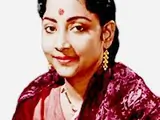The Immortal Geeta Dutt
Geeta Dutt was born into a rich zamindaar's family as Geeta Roy in Faridpur, East Bengal in 1930. In 1942, her parents shifted to a Dadar apartment in Bombay when she was twelve. Over there in their modest flat at Dadar, composer/music director Hanuman Prasad, overheard her singing casually and agreed to impart her training in singing. He launched her in a chorus song in Bhakht Prahlad (1946), where she sang only two lines. But her rendering of those two lines stood out and astonished everybody in the recording studio. Her major assignment was in the following year with Do Bhai. The music of that film clicked in a big way and Geeta became a top playback singer. 1947 - 1949 saw Geeta as the number one playback singer in the Bombay film industry as she moved from strength to strength.Only two playback singers managed to survive Lata's onslaught in the 1950s. They were Shamshad Begum and Geeta Roy. Though relegated to the second spot, Geeta managed to hold her own against Lata for more than a decade, and she and Lata became the premier female playback singers of the 1950s.
Initially, Geeta was a singer well known for singing bhajans and weepy, sad songs, but 1951 saw the release of Baazi. The jazzy musical score of the film by S.D. Burman created a new facet in Geeta's singing. The sex appeal in her voice and the ease with which she went western was marvelous to behold. From then on in the 1950s for a club dance and a seductive song, was the first choice was Geeta. During the recording of a song, she met the young and upcoming director of the film, Guru Dutt.
The first thing that strikes one when you hear Geeta Dutt sing was that she never sang. She just glided through a tune. Of all her contemporaries her musical training was perhaps the sketchiest but what she lacked in training and technique, she more than made up with her ability to breathe life and emotion into any song she was singing. To quote Raju Bharathan, Music Critic...
" Geeta Dutt was thandi hawa and kaali ghata rolled into one. The moment she came, you got the refreshing feeling of aa hi gayi jhoom ke. There was a rare swing in her voice. She hit you like a thunderclap..........This made Geeta Dutt the one singer that Lata Mangeshkar really feared. In training and technique Lata was way ahead but neither training nor technique was of much use when pitted against Geeta in the recording room........This put Lata on the defensive and I think she avoided singing with Geeta as far as possible. I vaguely remember Lata acknowledging this fact when Geeta died on July 20, 1972."
S.D. Burman was amongst the earliest to discover the magic in her voice with Do Bhai. He effectively used the Bengali lilt in her voice memorably in films like Devdas (1955) and Pyaasa (1957). In fact, no female singer has better articulated the spirit of Burmanda's music in its early years. O.P. Nayar had developed the side of Geeta which had emerged with Baazi. Under his freewheeling baton, Geeta developed into a really hep singer who could belt out any number - soft, sultry, happy, snappy, romantic, teasing or tragic. It was O.P. who got Geeta to stop being overly emotional in sad songs. However by 1957, Geeta's marriage had run through rough weather and was on the rocks. Guru Dutt had gotten romantically involved with his new leading lady Waheeda Rehman. The breaking up of her marriage also began giving repurcussions on her career. To quieten things down, Guru Dutt launched a film Gauri (1957) with her in the lead. She was to be launched as a singing star and it was to be India's first film in cinemascope but the film was shelved after just a few days of shooting. This was the time when one heard complaints from music directors about her not being easily available for rehearsals and recordings.
In fact, in 1957, when he fell out with Lata Mangeshkar, Burmanda was looking to make Geeta his main singer rather than the upcoming Asha Bhosle. After all Geeta was a mature singer while Asha was still raw. But due to her troubled marriage, Geeta was not able to practice in the style required by Burman who was a hard taskmaster regarding rehearsals. He joined O.P. Nayar in shaping Asha rather than wait for Geeta. Consequently, Asha not only took her place but went beyond her. And to make things worse, Geeta began finding solace in drinking. In 1964, Guru Dutt, passed away. Geeta was a broken woman, shattered by his death. She suffered from a nervous breakdown. When she recovered, she found herself in a financial mess. She tried to resume singing again, cutting discs at Durga Puja and giving stage shows and even doing a Bengali film Bhadu Bharan (1967) as heroine. But her health kept failing as she drank to a point of no return. But not before she showed she still had it in her were she given a mike to sing. Anubhav (1971), was her last film and was one of the finest works she ever did. But her drinking problems were not over and she passed away of Cirrhosis of the Liver in 1972 at the age of 41.
Geeta Dutt and Bengali songs
We know that her songs in Gujrati, Punjabi, and Marathi are equally beautiful as Bengali and Hindi. But lets restrict to her Bengali numbers and not comment on Hindi, Marathi and Punjabi songs here. For the interested readers to probe deeper into her artistry lets select a few songs from what is readily available in the market. Surprisingly enough, her songs are very upbeat and bright including her numbers on uncherished love. It is credited to her singing which is always a breath of fresh air. her Bengali songs can be catagorised in three segments: (a) bright and full of virtuosity; (b) deep emotional; and (c) melodic structure in focus.
For the first item we will select Sudhin Dasgupta's "Jhiri Jhiri Choitali Batashe" 1957. She sounds all through the bridge (Antara) very connected with admirable legato. Of course the accompaniment written by Sudhin Dasgupta is extremely appealing. Then there's "Krishnachura Agun Tumi" --- Sudhin Dasgupta's melody and poet Batakrishna Dey's lyric --- which has very similar flavor. Her vocal passages are unique as reflected in "Ogo Amar Moner Chiro Udash Anmona" 1960 music : Kanu Ghosh on Shyamal Gupta's words. "Sonay Dheke Anga" 1967, falls in this class. Salil Choudhury's words brings a magic which Geeta Dutt renders with superb quality and Kanu Ghosh's music is exceptionally brilliant as it connects passages. This is very uncommon in Bengali compositions where mostly words in rhyme are assigned to notes in simple meters.
For Getta Dutt's emotional songs one of the favorite is "Sachi Mata Go" 1952 of Mukul Roy's melody predates the Hindi hit of Sailaab (1955). Basudeb wrote beautiful words which sounds very modern as it deals with women's issues dating back four thousand years. Towards the end of her career 1967, she performs one of her masterpieces, somewhat waltzy, "Jaak na Muchhe Jaak", melody by Kanu Ghosh on Salil Choudhury's words. These songs are real challenge to Indian singers. She blends her training in Classical Indian music with her imagination and contemporary feelings.
Geeta Dutt's melodic songs are mostly in slow waltz. The foremost is of Sudhirlal Chakraborty's music on Pabitra Mitra's words, "Brindabone Shyam Nai" 1952. She hits the low notes in a superb manner, which is rather unheard of from Indian singers. Passages dominated by minor keys are sung with full richness. Later, in 1960, Binod Chatterjees music on Pulak Bannerjee's lyric "Hridoy Amar Kichhu Jodi Bole" exposed a darker side of emotion.
Geeta Dutt is a singer of modern songs in the true sense of the word modern. Without Rabindra sangeet, Nazrul Geety, Atul Prasadi, and without much of Salil Choudhury, she has been able to make an everlasting impression. She is truly immortal.
Some memorable songs sung by Geeta under S.D. Burman's batons are:
'Mera sundar sapna beet gaya' (Do Bhai - 1947)
'Kaali Ghata Chhaye Mora jeeya Tarsaye' (Sujata - 1959)
'Tadbir se bigdi hui taqdeer' (Baazi - 1951)
'Aan milo aan milo' (Devdas - 1955) with Manna Dey
'Aaj sajan mohe ang lagalo' (Pyaasa - 1957)
'Hawa dhire aana' (Sujata - 1959)
'Waqt ne kiya kya haseen sitam ' (Kaagaz ke Phool - 1959)
Geeta sang 72 songs for S D Burman of which 43 were solos. The last song she recorded for him was from the film Ziddi(1964), 'Main tere pyaar mein kya kya na bana dilbar.'
Some memorable songs sung by Geeta under O. P. Nayyar's baton are:
'Zara saamne aa'( Baaz - 1953 )
'Babuji dhire chalna' (Aar Paar - 1954 )
'Thandi hawa kali ghata' (Mr. & Mrs 55 - 1955 )
'Jab badal lehraya' (Chchoomantar - 1956 )
'Humko Chhorke Kaha jaoge' (Shrimati 420 - 1956 )
'Chor, lutere, daku'( Ustad - 1957 )
'Mera naan chin chin choo' (Howrah Bridge - 1958 )
'Kaisa jadoo balam tune dara' (12 o'clock - 1958 )
O.P.'s comments on Geeta :
" ..........Who will deny there is a unique quality to her singing. Give her a blatantly westernized tune this momentand a complex classical composition the next, and she will do equal justice to both with an ease of expression which a singer can only be born with. She is particularly good for songs accompanying boisterous jamborees. With that tantalizing lilt and fascinating curves she puts into her singing,she is the ideal choice if it is seductive allure you want in a song........Geeta Dutt is an asset to any music director. "
This is not to say that Geeta was any less effective with other music directors. The songs she has sung for Hemant Kumar in Anandmath ( 1952 ), Bahu ( 1954 ),Ek Jhalak ( 1957 ), Sahib Bibi aur Ghulam ( 1962 ) bear testimony to this. It's just that for the sheer volume and the scaleof popularity that the songs of S.D. Burman and O.P. Nayyar reached make them special in Geeta's oeuvre.
The ten songs she selected then represented definite landmarks in her singing career.
'Mat ja mat ja jogi' (Jogan - 1950 ) This was her own personal favourite.
'Mera sundar sapna beet gaya' (Do Bhai - 1947 )
'Na yeh chand hoga' (Shart - 1954 )
'Tadbir se bigdi hui taqdeer' (Baazi - 1951 )
'Yeh lo main hari piya' (Aar Paar - 1954 )
'Khayalon mein kisike' (Baawre Nain - 1950 ) with Mukesh
'Aaj sajan mohe ang laga lo' (Pyaasa - 1957 )
'Jaane kya tunhe kahi' (Pyaasa - 1957 )
'Ae dil mujhe bata de' (Bhai Bhai - 1956 )
'Hai yeh duniya kaunsi' (Sailaab - 1956 )
This as mentioned was in early 1957. Citing the reason for her selections Geeta mentioned
" I feel that a song must express human emotions in simple language and in a tune that affords the singer sufficient scope to do full justice to the thought underlying the lyric. I feel that the songs I have listed are simple enough to be appreciated by people of all ages at all times."
Geeta Dutt Bengali Songs :
Jhiri Jhiri Chaitali
Aakash Jure Sapno Maya
Krishna chura Aagun Tumi
O sur bhara Dur Nilimai
Phuler Bone laglo je dol




























